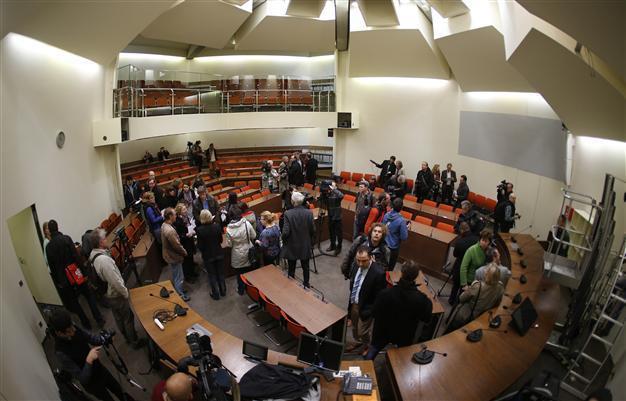German neo-Nazi murder trial delayed after media access ruling
BERLIN - Agence France-Presse

Journalists visit a courtroom in the Regional Court in Munich, southern Germany, Friday, April 12, 2013. AP Photo
The start of the most high-profile neo-Nazi murder trial in Germany's history was delayed from this week after judges announced Monday an overhaul of rules giving media access.
Proceedings were to have begun Wednesday against a woman accused of being part of a far-right killer cell blamed for 10 murders. But because Germany's top court ordered the Munich judges last week to expand foreign media access to the trial its starting date had to be put back.
Hearings are now to begin on May 6, the court said.
"The court explained that in light of the ruling of the Federal Constitutional Court from April 12, 2013, a new press accreditation process will be necessary and this would not be possible ahead of the planned start of the trial on April 17, 2013," a court spokeswoman said in a statement.
Beate Zschaepe, believed to be the last surviving member of a gang known as the National Socialist Underground accused of killing eight ethnic Turks, a Greek man and a German policewoman between 2000 and 2007, is to stand trial with four alleged accomplices.
Germany's highest court on Friday upheld a complaint by a Turkish newspaper over media access to the trial in a controversy that had strained ties with Ankara.
The presiding judge in the case had assigned guaranteed seats at the hearings on a first-come, first-served basis, resulting in German reporters taking nearly all 50 of the reserved places and most international media outlets having no reliable access to the courtroom.
After a lawsuit by Turkish newspaper Sabah, the Federal Constitutional Court ruled that the Munich tribunal must provide "an appropriate number of seats to representatives of foreign media with a particular connection to the victims".
The federal judges suggested reserving at least three seats for foreign media or restarting the press accreditation process from scratch.
The Turkish government, victims' representatives, German leaders and journalists had hit out at a lack of "sensitivity" by the Munich court in light of the massive public interest in the case.
The leader of Germany's three-million-strong Turkish community, Kenan Kolat, blamed the Munich court's missteps on media access for the trial's delay.
"Everything must be done to ensure that the the verdict cannot be questioned in the end," Kolat told the daily Die Welt in an interview to be published Tuesday.
The trial covers the shootings of nine immigrants that took place in different cities around Germany, in small businesses such as a florist's, an Internet cafe, snack and vegetable shops during normal opening hours.
Zschaepe is also accused of involvement in 15 armed robberies, arson and attempted murder in two bomb attacks, with 600 witnesses due to take the stand during the proceedings which could last more than two years.
She faces life in prison if convicted. Four male alleged accomplices will also go on trial on lesser charges.
Dubbed the "Nazi moll" in the media, morbid fascination in the bespectacled brunette has been heightened by her refusal to talk while in custody since she turned herself in to police.
Zschaepe and her alleged NSU accomplices, Uwe Mundlos and Uwe Boehnhardt, who were reportedly linked in a love triangle, are believed to have gone underground in 1998 after police discovered their bomb-making operation.
Prosecutors say they funded their crime spree for 13 years with bank and post office robberies until the two men were found shot dead in an apparent murder-suicide following a heist on November 4, 2011.
